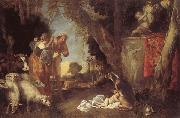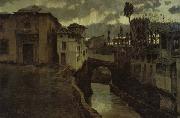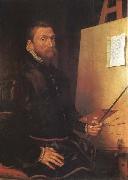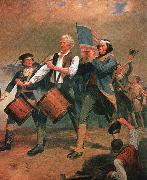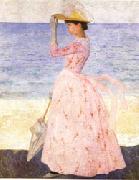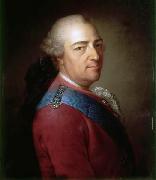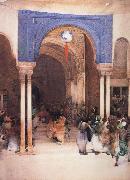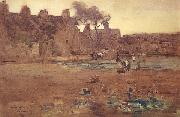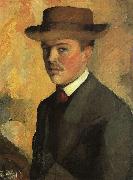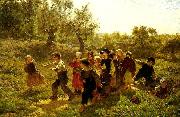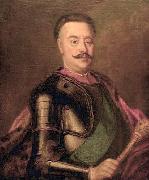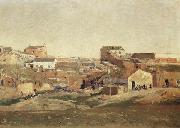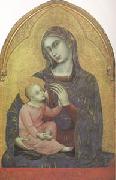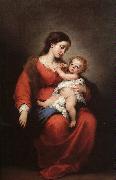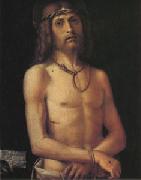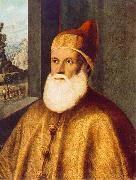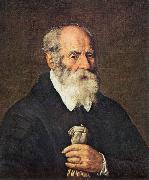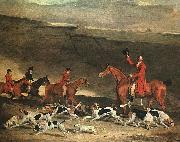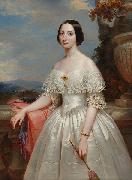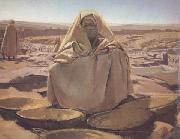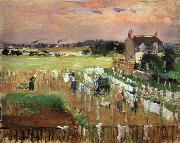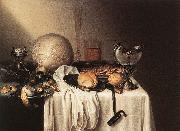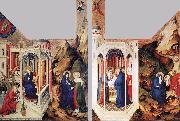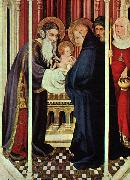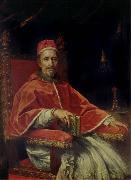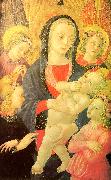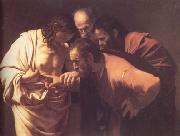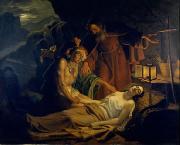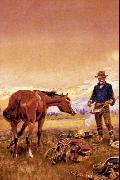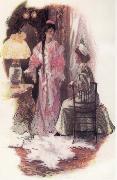|
|
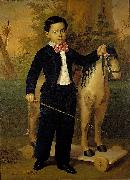 |
Antonio Maria Esquivel
|
|
Nacio en Sevilla en 1806. Comenzo los estudios de pintura en la Academia de Bellas Artes de Sevilla. Alli se familiarizo con la tecnica pictorica y el detallismo al estilo de Murillo.
En 1831, se traslado a Madrid, donde concurso en la Academia de San Fernando, siendo nombrado academico de merito. En contacto con el ambiente intectual madrileno de esos anos, participo activamente en la fundacion del Liceo Artistico y Literario en 1837, donde daria clases de Anatomia, asignatura que impartiria tambien mas tarde en la Academia de San Fernando.
En 1839, otra vez en Sevilla, sufrio una enfermedad que le dejo practicamente ciego; el artista, sumido en una profunda depresion, se intento suicidar arrojandose al rio Guadalquivir. Enterados sus companeros y amigos poetas y artistas y movilizados por el Liceo para ayudarle, sufragaron entre todos un caro tratamiento realizado por un prestigioso oftalmologo frances. Gracias a esto, en 1840 sano y recupero la vision. El artista, agradecido, pinto a sus amigos, poetas y pintores del Romanticismo, en un cuadro que se ha hecho justamente celebre. Como reconocimientos oficiales, recibo la placa del Sitio de Cadiz y la Cruz de Comendador de la Orden de Isabel la Catolica. En 1843 es nombrado Pintor de Camara y en 1847 academico de San Fernando, siendo ademas miembro fundador de la Sociedad Protectora de Bellas Artes. Como teorico de la pintura, redacto un Tratado de Anatomia Pictorica, cuyo original se guarda en el Museo del Prado. Fallecio en Madrid en 1857.
Sus hijos Carlos Maria (1830-1867) y Vicente tambien fueron pintores. |
|
|
|
|
|
|
|
|
|
|
|
|
|
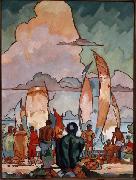 |
Arman Manookian
|
|
(1904 - 1931) was an Armenian-American painter. He was the oldest of three children born to a Christian Armenian family in Constantinople. As a teenager, he survived the Armenian Genocide. Manookian immigrated to the United States in 1920, at the age of 16, and studied illustration at the Rhode Island School of Design. He also took classes at the Art Students League of New York before enlisting in the United States Marine Corps in 1923. While serving in the U. S. Marine Corps he was assigned as a clerk to the author and historian, Major Edwin North McClellan. In 1925, McClellan and Manookian were transferred to Pearl Harbor. The latter supplied illustrations for Leatherneck Magazine and produced about 75 ink drawings for McClellanes history of the United States Marine Corps, which was never published. These drawings are now in the collection of the Honolulu Academy of Arts.
In 1927, Manookian was honorably discharged from the Marine Corps, but remained in Hawaii. He worked for the Honolulu Star-Bulletin and for Paradise of the Pacific.
His paintings are rare and highly valued due to his early death, by suicide, in 1931, and fewer than 30 are in existence. The Honolulu Academy of Arts held a memorial exhibition shortly after Manookianes death and a retrospective exhibition titled Meaning in Color/Expression in Line: Arman Manookianes Modernism Nov. 4, 2010 through April 24, 2011. The Bishop Museum and the Honolulu Academy of Arts are among the public collections holding works by Arman T. Manookian. According to the State of Hawaii's House of Representatives, he is "known as Hawaii's Van Gogh".
In early 2010 a group of seven Manookian paintings owned by the Hotel Hana-Maui were removed from public display. They were the only Manookian oil paintings known to be on public display anywhere in the world. Two of the murals, Red Sails and Hawaiian Boy and Girl, are now on long-term loan to the Honolulu Academy of Arts.
|
|
|
|
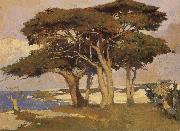 |
Arthur Mathews
|
|
an American Tonalist painter who was one of the founders of the American Arts and Crafts movement
1860-1945
|
|
|
|
|
|
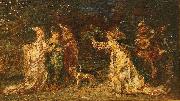 |
Artist Adolphe Joseph Thomas Monticelli
|
|
(October 14, 1824 - June 29, 1886) was a French painter of the generation preceding the Impressionists.
Monticelli was born in Marseille in humble circumstances. He attended the École Municipale de Dessin in Marseille from 1842 to 1846, and continued his artistic training in Paris, where he studied under Paul Delaroche at the École des Beaux-Arts. In Paris he made copies after the Old Masters in the Louvre, and admired the oil sketches of Eugene Delacroix. In 1855 he met Narcisse Diaz, a member of the Barbizon school, and the two often painted together in the Fontainebleau Forest. Monticelli frequently adopted Diaz's practice of introducing nudes or elegantly costumed figures into his landscapes.
He developed a highly individual Romantic style of painting, in which richly colored, dappled, textured and glazed surfaces produce a scintillating effect. He painted courtly subjects inspired by Antoine Watteau; he also painted still lives, portraits, and Orientalist subjects that owe much to the example of Delacroix.
After 1870, Monticelli returned to Marseille, where he would live in poverty despite a prolific output, selling his paintings for small sums. An unworldly man, he dedicated himself singlemindedly to his art.
The young Paul Cezanne had befriended Monticelli in the 1860s, and the influence of the older painter's work can be seen in Cezanne's work of that decade. Between 1878 and 1884 the two artists often painted landscapes together, once spending a month roaming the Aix countryside. Although Monticelli experimented briefly around 1870 with a treatment of light reflecting the discoveries of the Impressionists, he found the objectivity of this approach uncongenial.
Confronted with criticism of his style of painting Monticelli himself remarked, "I paint for thirty years from now". The work of this instinctive painter reached its greatest spontaneity in the decade before his death in 1886.
|
|
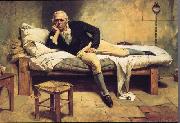 |
Arturo Michelena
|
|
16 June 1863 - 29 July 1898) was a Venezuelan painter born in Valencia, Carabobo State. He began to paint at a young age under his father's tutelage. Traveled to Paris where he studied in the famous Academie Julian. He was the first Venezuelan artist to succeed overseas and, with Cristebal Rojas (1857-1890) and Marten Tovar y Tovar (1827-1902), one of the most important Venezuelan painters of the 19th century.
His first great success occurred in Paris at Le Salon des Artistes Français in 1887. Encouraged by his teacher Jean-Paul Laurens (1838-1921), Michelena presented a canvas titled L'Enfant Malade (The sick boy) which was awarded the Gold Medal, second class, the highest honor a foreign artist could receive at the salon. The painting was quickly considered a masterpiece and was acquired by the Astors in New York in the late 19th century. Later the painting traveled to South Florida when it was acquired by Owens Burns, a business partner of John Ringling, the circus magnate. After Burns' death the painting was stored in the Ringling Museum's vaults where it remained away from public view for more than 60 years. In 2004 Sotheby's rescued the canvas and arranged for it to be included in an auction of Latin American art.
|
|
|
|
|
|
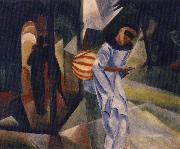 |
auguste macke
|
|
August Macke (1887-1914) was a German painter whose harmonious and simple scenes of everyday life made a unique contribution to Expressionism. |
|
|
|
|
|
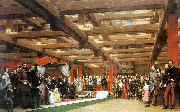 |
Barabas Miklos
|
|
(February 10, 1810 in Mărcuşa, now Romania - February 12, 1898 in Budapest) was a Hungarian painter. He his mostly known for his portrait paintings.
He was born in Kezdimerkosfalva. He spent most of his life in Pest, where he was director of the art society from 1862 until his death. He became a member of the Parliament of Hungary in 1867. He died in Budapest.
|
|
|
|
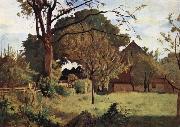 |
Barthelemy Menn
|
|
(20 May 1815 - 10 October 1893) was a Swiss painter and draughtsman who introduced the principles of plein-air painting and the paysage intime into Swiss art.
Menn was born in Geneva as the youngest son of four to Not (Rhaeto-Romance language form for Louis) Menn, a confectioner from Scuol in the canton of Grisons, and Charlotte-Madeleine-Marguerite Bodmer, the daughter of a wealthy farmer from Coinsins in the Canton de Vaud. Already at the age of twelve, Menn took drawing lessons from the little known Jean Duboi (1789-1849), and later, he entered the drawing school of the Geneva Arts Society. The repeated claim that he was also a pupil of the famous enameller Abraham Constantin (1785-1855) appears to be erroneous. In 1831, Menn was second in the annual drawing competition of the Geneva Art Society. The following year, he entered the studio of the Swiss history painter Jean-Leonard Lugardon (1801-1884), who was a pupil of Baron Gros(1771-1835) and acquainted with Jean-Auguste-Dominique Ingres (1780-1867). There, Menn was educated in figure drawing and composition before heading for Paris, where, in fall 1833, he entered the studio of Ingres. He was, therefore, no beginner when meeting the master, but needed some polishing and refinement in his art. In a letter to his friend Jules Hebert, Menn reported on the new situation: eEverybody, even the eldest in the studio tremble before Mr. Ingres. One fears him a lot in such a way that his corrections have a great impact. He is of an extreme sensibility,e while the education in Ingrese studio has been described by Theophile Silvestre, as follows: 'The students spend half of their time studying nature and half studying the masters among which they are especially attached to Phidias, the bas-reliefs of the Parthenon, classical sculpture in general.e This explains why among Menn's early works there are many copies after the Parthenon frieze that was accessible in Paris in a set of plaster casts at the Ecole des Beaux-Arts since 1816. (Fig. 2). Menn also copied several works by Raffael, Titian (Fig. 3), Veronese and Rubens in the Louvre, and works by Ingres.
When the latter decided to give up his studio to take the post as director of the French Academy in the Villa Medici in Rome, Menn returned to his grandparents in Coinsins before following his master in fall 1834. His journey led him first via Milan to Venice, where he met briefly his compatriot Louis-Leopold Robert (1798-1835), and where he would copy works by Titian and Tintoretto. He then travelled via Padua and Bologna to Florence, where he met old classmates from Ingrese studio, and arrived finally in Rome in spring 1835. There, Menn copied works by Raphael and Michelangelo, but he also started to produce extraordinary fresh small landscape paintings in the open air. In summer 1836, he visited the Campagna, Capri and Naples, where too he drew and painted landscapes directly from nature, and copied classical antiquities from Pompeii as well as Giovanni Bellini's Transfiguration in the Museo Borbonico. When back in Rome, he produced history - and genre paintings, of which in 1837, he sent 'Solomon presented to Wisdom by his Parents' (Salomon presente e la sagesse par son pere et sa mere; Fig.N) to the annual Salon in Geneva. Menn returned via Florence, Siena and Viterbo to Paris in late 1838, where he exhibited at the Salon from 1839 to 1843, and where he became the drawing master of Maurice Dudevant, the son of George Sand. In her circle, he became acquainted with Eugene Delacroix (1798-1863) who wanted to employ him as an assistant while working on the decoration of the cupola of the library in the Palais du Luxembourg. At the same time, Menn got to know the painters of the Barbizon School, and especially Charles Daubigny (1817-1878). Most importantly, however, Menn became friends with Camille Corot (1796-1875), who, from 1842 onwards, visited Switzerland frequently. It was also in Paris that he became acquainted with members of the Genevan Bovy family who followed the utopian socialist ideas of Charles Fourier.
|
|
|
|
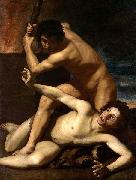 |
Bartolomeo Manfredi
|
|
(baptised 25 August 1582 - 12 December 1622) was an Italian painter, a leading member of the Caravaggisti (followers of Michelangelo Merisi da Caravaggio) of the early 17th century.
Manfredi was born in Ostiano, near Cremona. He may have been a pupil of Caravaggio in Romeat his famous libel trial in 1603 Caravaggio mentioned that a certain Bartolomeo, accused of distributing scurrilous poems attacking Caravaggio's detested rival Baglione, had been a servant of his. Certainly the Bartolomeo Manfredi known to art history was a close follower of Caravaggio's innovatory style, with its enhanced chiaroscuro and insistence on naturalism, with a gift for story-telling through expression and body-language.
Caravaggio in his brief careerehe rocketed to fame in 1600, was exiled from Rome in 1606, and was dead by 1610 had a profound effect on the younger generation of artists, particularly in Rome and Naples. And of these Caravaggisti (followers of Caravaggio), Manfredi seems in turn to have been the most influential in transmitting the master's legacy to the next generation, particularly with painters from France and the Netherlands who came to Italy. Unfortunately no documented, signed works by Manfredi survive, and several of the forty or so works now attributed to him were formerly believed to be by Caravaggio. The steady disentangling of Caravaggio from Manfredi has made clear that it was Manfredi, rather than his master, who was primarily responsible for popularising low-life genre painting among the second generation of Caravaggisti.
Manfredi was a successful artist, able to keep his own servant before he was thirty years old, "a man of distinguished appearance and fine behaviour" according to the biographer Giulio Mancini, although seldom sociable. He built his career around easel paintings for private clients, and never pursued the public commissions upon which wider reputations were built, but his works were widely collected in the 17th century and he was considered Caravaggio's equal or even superior. His Mars Chastising Cupid offers a tantalising hint at a lost Caravaggio: the master promised a painting on this theme to Mancini, but another of Caravaggio's patrons, Cardinal Francesco Maria Del Monte, had taken it, and Mancini therefore commissioned Manfredi to paint another for him, which Mancini considered Manfredi's best work.
Manfredi died in Rome in 1622. Gerard Seghers (or Segers; 1589-1651) was one of his pupils
|
|
|
|
|
|
|
|
|
|
|
|
|
|
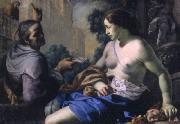 |
Bernardino Mei
|
|
(1612/15 - 1676) worked in a Baroque manner in his native Siena and in Rome, finding patronage above all in the Chigi family.
Briefly a pupil of the Sienese draughtsman and cartographer Giuliano Periccioli, where he learned the art of engraving, Bernardino passed to the studio of the painter Rutilio Manetti and probably also served in the workshop of Francesco Rustici.
He painted in and around Siena, where his work came to the attention of Cardinal Fabio Chigi, who, once elected pope as Alexander VII (1655), called Bernardino Mei to Rome in 1657. There Bernardino came under the influences of Mattia Preti, Andrea Sacchi and Pier Francesco Mola, and of Guercino, to the extent that until the 20th century Bernardino's fresco of Aurora in Palazzo Bianchi Bandinelli was attributed to Guercino himself. Through the fast friendship that bonded him to Gian Lorenzo Bernini, whose studio he frequented, he applied that sculptor's sense of theatrical action to his own mythological and allegorical subjects. He died in Rome in 1676.
|
|
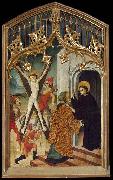 |
Bernat Martorell
|
|
was a Spanish painter, working in an Early Renaissance style. Little is known of his life prior to 1427, though by the mid 15th century he was one of the leading artists in Catalonia.
|
|
|
|
|
|
|
|
|
|
|
|
|
|
|
|
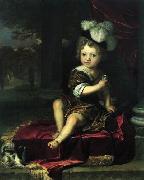 |
Carel de Moor
|
|
(February 25, 1655 - February 16, 1738) was a Dutch Golden Age etcher and painter. He was a pupil of Gerard Dou.
Carel de Moor was born in Leiden. According to Houbraken, his father was an art dealer who wanted him to study languages and only allowed him to study art when his talent for drawing surfaced at a young age. Houbraken met him in person at the atelier of Godfried Schalcken when he was completing his education there. According to the RKD he was the son of a Leiden painter of the same name and a pupil of Dou, Frans van Mieris, Godfried Schalcken, and Abraham van den Tempel. He became a member of the Leiden Guild of St. Luke in 1683, and became deacon many times over in the years 1688-1711. His own pupils later were Pieter Lyonet, Andrei Matveev, Arent Pijl, Arnout Rentinck, and Mattheus Verheyden.
|
|
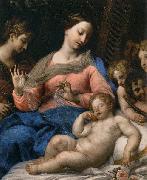 |
Carlo Maratta
|
|
(13 May 1625 - 15 December 1713) was an Italian painter, active mostly in Rome, and known principally for his classicizing paintings executed in a Late Baroque Classical manner. Although he is part of the classical tradition stemming from Raphael, he was not exempt from the influence of Baroque painting and particularly in his use of colour. His contemporary and friend, Giovanni Bellori, wrote an early biography on Maratta.
|
|
|
|
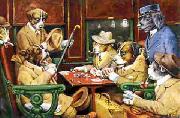 |
Cassius Marcellus Coolidge
|
|
(September 18, 1844?CJanuary 13, 1934) was an American artist, best known for a series of nine paintings of anthropomorphized dogs.
Born in upstate New York to abolitionist Quaker farmers, Coolidge was known to friends and family as "Cash." While he had no formal training as an artist his natural aptitude for drawing led him to create cartoons for his local newspaper when in his twenties. He is credited with creating Comic Foregrounds, life-size cutouts into which one's head was placed so as to be photographed as an amusing character.
In 1903, Coolidge contracted with the advertising firm of Brown & Bigelow of St. Paul, Minnesota, to create sixteen oil paintings of dogs in various human poses. |
|
|
|
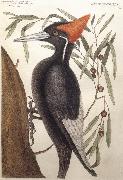 |
Catesby Mark
|
|
English-born artist-naturalist and Traveller, b.c.1679 d.1749
|
|
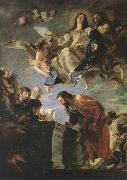 |
CEREZO, Mateo
|
|
Spanish painter (b. ca. 1626, Burgos, d. 1666, Madrid) |
|
|
|
|
|
|
|
|
|
|









